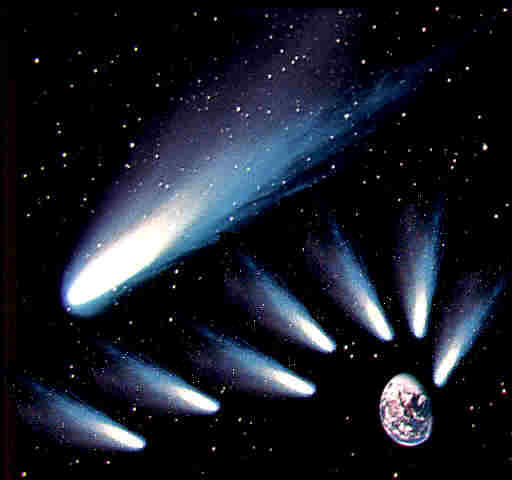"Grace be unto you, and peace, from him which is,
and which was, and which is to come; and from the seven Spirits which are before his
throne; and from Jesus Christ, who is the faithful witness, and the first begotten of the
dead, and the prince of the kings of the earth." Revelation 1:4, 5
Grace and peace is extended to all the saints from three
sources. We rejoice in this greeting even as we puzzle over just exactly who is sending
it. God we recognize and Jesus Christ the faithful witness we know, but
Who or what are these
"seven Spirits
who are before His throne?"
Our curiosity is aroused. Did you ever get a greeting from a source you
did not know? It leaves you a little embarrassed. So this "grace" and
"peace" which is being sent to you from the "seven Spirits who are before
His throne" present an air of mystery. Let us hope that when we are finished we may
together have a clearer understanding. You may actually know more about these "seven
Spirits" than you thought you knew.
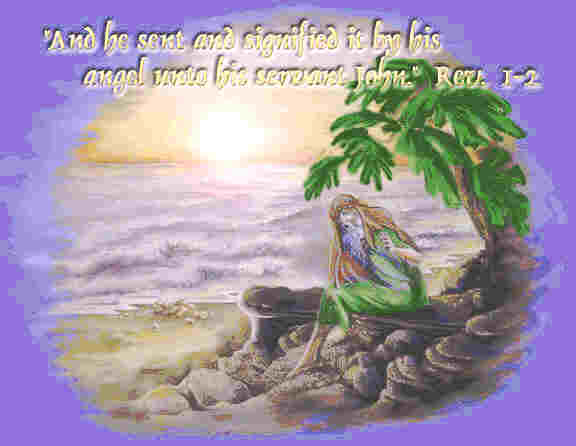
John on the Isle of Patmos |
Revelation 1:4 is a vital text in understanding how Revelation was written.
Sometimes we think that John was playing the role of a shorthand
secretary who writes as Jesus Christ dictates.
Such was not the case.
|
John saw Revelation 4 and 5 before he wrote chapter one. John
injects into chapter one what he could not have seen until chapter four. For instance, it
is in Revelation 4:5 that we are told about "seven lamps of fire burning before the
throne, which are the seven Spirits of God."
John recalls this vision and that these "seven Spirits of
God" were before the great throne. However, in this chapter the "seven
Spirits" were stationary. They were not sent forth and no greetings were
mentioned.
John saw the vision of Revelation 5:6 in which he saw a
"Lamb"
with "seven horns and with seven eyes, which are the seven Spirits of God
sent forth into all the earth." The "seven Spirits" are now
identified with the Lamb. We have now been given three different descriptions of
these "seven Spirits of God." It is not until Revelation 5:6 that the
"seven Spirits" are SENT FORTH.
1. Revelation
4:5

|
"Seven lamps of fire
burning before the throne, which
are the seven Spirits of God."
|
2. Revelation
5:6
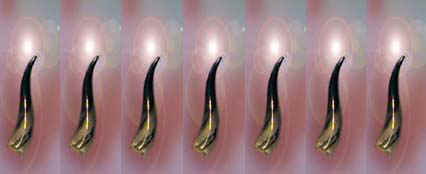
|
These same "seven Spirits"
are identified with the Lamb and
are called "seven
horns"— the power of the Lamb in the
"seven churches."
|
3. Revelation
5:6
  
    |
The
"seven horns" are with "seven
eyes"—the far-seeing wisdom of the Lamb
expressed to the "seven churches."
|
Revelation 4:5 speaks of the "seven Spirits" as "burning
before the throne," but they were not yet sent forth. They would not be and
could not be sent forth until the Lamb was found "worthy" to open the
"seven seals" and release the information contained therein.
There is "but one God, the Father, of whom are all things, and we
in him: and one Lord Jesus Christ, by whom are all things, and we by him."
(1
Corinthians 8:6) As long as the Lamb had not been slain, the "seven Spirits of
God" just "burned before the throne" as "lamps" or
"torches." They were a part of God’s plan and purpose, but they were not
sent forth. They were not activated.
So we see a stationary vision in Revelation 4, but in Revelation 5 the
Lamb is energized and through him the "seven Spirits of God" are "sent
forth
into all the earth" to gather His elect from the "four winds of heaven and the
four corners of earth."
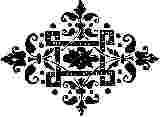
"The Words of Him Who Has the
Seven Spirits of God and the Seven Stars"
|
"And to the angel of the church in
Sardis write: These things saith he that hath the seven Spirits of God, and the seven
stars."
Revelation 3:1
|
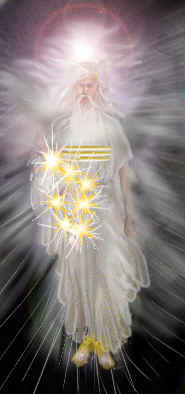
|
Here we learn that John saw Revelation 5 before he penned this
verse. It is important that we understand this, because it helps us realize that the whole
of Revelation is not given in absolute time sequences.
Revelation 4 and 5 were seen and absorbed by John before he wrote
Revelation 1 and 3. Only God possessed the "seven Spirits of God" in Revelation
4. Then we find the worthy Lamb in Revelation 5, who is described as the "Lamb"
as though it had been slain, "with seven horns and with seven eyes, which are the
seven Spirits of God sent forth into all the earth."
John comprehended the message of Revelation 5 before he penned
Revelation 3. John, therefore, wrote with a great deal of understanding. He had absorbed
the vision, and then subsequently recorded it.
The same is true of John's Gospel. Nearly one-quarter of his Gospel
covers the last day of Jesus' life. John gives details no other Gospel writer supplies.
Chapters 13-19 of John's Gospel have an intense focus on the last day of Jesus’ life.
John was the only disciple to stay with Jesus through the last night,
and who absented himself perhaps for no more than an hour while Jesus was carrying the
cross. Except for John's report, we would not have known what transpired during Jesus'
last night. Only Jesus’ enemies would have been the witnesses. John seems to have
total recall, recording Jesus’ discourse and his complete prayer in John Chapter 17.
Even though John was very old when he wrote Revelation, he did not lose
his total recall or his artist’s eye for detail. Whether this was John’s natural
ability alone or whether the holy Spirit strengthened his natural abilities, we are glad
John did not miss any details. John was heaven’s choice to give us the
Revelation of Jesus Christ.
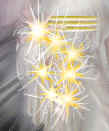
7 Stars Represent
the 7 Angels |
We learn in Revelation that Jesus has both
"the seven Spirits of God" and the "seven stars." Who are the
"seven stars"?
Revelation 1:20 says, "The seven stars are the angels of
the seven churches and the seven candlesticks which thou sawest are the seven
churches." Jesus holds the "seven stars" in his right hand. That
is a place of power.
It would be a tragic mistake to ignore the "star" or
"angel" of the period of the church that we live in. Any insubordination on our
part would be a grave offense to our Master.
Let us be careful not to imbibe the world’s infatuation with power
and influence. The Scriptures tell us, "Let each esteem others better than
themselves." In our time many are chaffing with the thought that anyone could be used
of God in a higher way than himself or herself.
As a case in point, the woman’s movement is constantly
attacking the Bible for excluding women from the pulpit. It has become an obsession. The
devil is still at work telling the modern Eves that God is withholding from them worlds of
power and light. They want and are partaking of the "forbidden fruit" again. The
media has fanned the flames of ambition and power lust in all classes of society to the
hurt and downfall of this present evil world.

A Golden Candlestick with
"Seven Lamps"
and "Seven Pipes" and "Two Olive Trees"
"I have looked, and behold a candlestick all of gold, with a bowl upon the top
of it, and his seven lamps thereon, and seven pipes to the seven lamps, which are upon the
top thereof:
"And two olive trees by it, one upon the right side of the bowl, and the other
upon the left side thereof."
Zechariah 4:2, 3
The lesson is very clear and similar to Revelation in depicting the
seven stages of the one Gospel church. We see the source of the church's sustenance. It is
the two olive trees (the Old and New Testaments) on either side of the
"candlestick." There are two "golden pipes" bringing the
"oil" from the trees to the candlesticks.
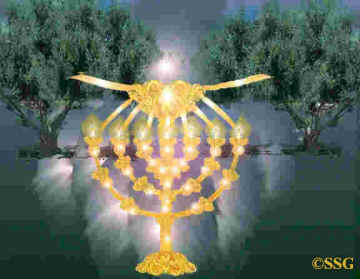
Golden Candlestick of Zechariah 4
|
"What be these two olive branches which through the two golden pipes empty
the golden oil out of themselves?
"And he answered me and said, Knowest thou not what these be? And I said,
No, my lord.
"Then said he, These are the two anointed ones
[the Old and New
Testaments], that stand by the Lord of the whole earth."
Zechariah
4:12-14
The church's source for sustenance is the "oil" from the
two "olive trees" or, as in Revelation 11:3, the two witnesses of the Old and
New Testament. Just as lamps need to be cleaned and maintained, so the church has needed
angels or messengers to trim their lamps to get the true light and not a carbon-filled
smoking flame that gives off more smoke than light.
When I was a boy, we had kerosene lamps. The wicks
needed to be cut and trimmed. As wicks burned, they became filled with
carbon, and the kerosene could not flow through the carbon-choked
end. Then it would start burning more wick than
oil, giving off smoke, soot, and very poor light. Left this way, the wicks would burn out.
Even the pure oil of these olive trees cannot burn through a
carbon-choked wick. Likewise, as the light of the Lord’s Word burns through human
wicks, our humanness gets in the way. Our carbon-filled personalities begin to give off
smoke and soot. Instead of the pure light of God’s Word shining forth, we have
soot-filled creeds and carbon-filled personalities giving forth more black smoke than
light.
The Lord knew this and engaged "seven stars" or "seven
messengers" to trim the lamp of God’s Word in each stage of the church, a very
necessary service. The light would be the light of the Lord’s Word in each time and
place. Happy are those who can receive it and walk in its light. But there are always some
who say the old smoke and soot light was better.
Zechariah 4:10 refers to "seven eyes." "Those
seven; they are the eyes of the Lord, which run to and fro through the whole earth."
These "eyes of the Lord" represent the far-seeing wisdom or perfect wisdom of
God which provides the churches with Heavenly Wisdom from above. God employs the eyes of
His beloved Son in each stage of the church.
Hence, we read of, "A Lamb as it had been slain, having
seven horns and seven eyes, which are the seven Spirits of God sent forth into all the
earth." Revelation 5:6 We see how Zechariah 4:10 and Revelation 5:6 speak in
similar language.

"After This"—Rev. 4:1
"After this
[the vision of the seven churches] I looked, and, behold, a
door was opened in heaven: and the first voice which I heard was as it were of a trumpet
talking with me; which said, Come up hither, and I will shew thee things which must be
hereafter [that is, after the saints enter the open door and come up
hither]." Revelation 4:1
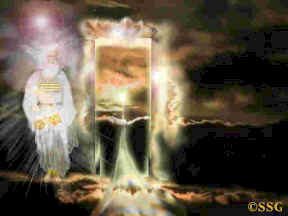
"...Behold, a door was opened
in heaven..."
|
The lesson of the open door indicates this "door" was not
always open. Rather, it seems the "door in heaven" opens for the first time, and
then the invitation is given to the John Class to enter through this "door" and
to "Come up hither."
What a wonderful privilege is here extended to the saints. What an
honor! It is not the great and mighty people of earth who are invited—only the John
Class. Imagine the splendor as John ascends through this open door and sees the glorious
vision of the throne scene reserved for those who love him.
The first voice mentioned in Revelation 4:1 refers most likely to
Revelation 1:10 in which John says, "I was in the Spirit on the Lord’s
day [the Sabbath day, the Millennial day], and I heard behind me a great
voice, as of a trumpet [the King’s court majesty]." The same voice in
Revelation 1:10 is engaged in Revelation 4:1, which shows us the throne scene of God.
Appropriately, the majestic regal sound of a trumpet is employed to describe this vision.
"And immediately I was in the spirit, and, behold, a throne was set in heaven,
and one sat on the throne." Revelation 4:2
John could not enter through this door in the flesh, but in the
spirit-begotten condition the John Class sees God’s throne and glory.
We see God’s glory in the Divine Plan of the Ages. Many in the
churches today cannot see God’s glory. They see a throne in heaven, but on it they
see a triune god, vindictively casting unsaved souls into a burning hell. Not much glory
is there?
The One seated on the throne is none other than the Lord
God Almighty. The throne represents God’s Divine government, which is in complete
control of all things animate and inanimate, except for sinful mankind. Even here, in the
outworking of God’s Plan, heaven and earth shall alike be under God’s control
and dominion.
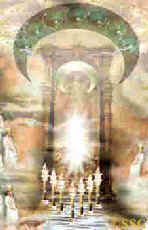
|
"And he that sat was
to look upon like a jasper and a sardine stone: and there was a rainbow round about the
throne, in sight like unto an emerald."
Revelation
4:3
|
"Jasper" here probably represents a diamond. In Revelation 21:11
the jasper is said to be as clear as crystal. God is portrayed as translucent as a
diamond. This seems to compare favorably with John’s description of Him, saying,
"God is light, and in him is no darkness at all." 1 John 1:5
Paul supports the same thought in 1 Timothy 6:16, saying, God
"dwells in unapproachable light." Because God’s true glory could not be
seen by anyone in the flesh, John is shown the nearest thing to describe God’s glory
and purity.
God is also described as being a "carnelian" stone, or a
"sardine" or ruby—pure and translucent, but also red in hue. Red pictures love
as shown in the ransom. Around God’s throne is a rainbow of emerald green
representing God’s enduring or everlasting qualities.
The John class in the spirit-begotten condition is given a high and
exalted view of God and His eternal government as seen from His glorious throne. This
vision of God and His throne must never leave us. Only our knowledge of God’s
plan through the ages, enables us to see God in such transcendent glory. It is a plan that
promises "glory and honor for everyone that doeth righteousness."

Twenty-Four Elders
"Round the throne were twenty-four thrones, and seated on the thrones were
twenty-four elders, clad in white garments, with golden crowns upon their heads."
Revelation 4:4
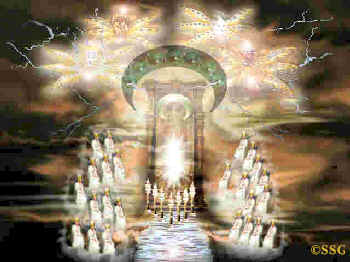
24 Elders Around the Throne
|
We understand the twenty-four thrones
represent the foreordained twenty-four courses of the priesthood. In 1 Chronicles
24:1-19, David divided the service of the priests into twenty-four divisions. This method
of service continued until Zechariah’s time.
In Luke 1:8,9 we read, "Now while he was serving as priest before
God when his division was on duty, according to the custom of the priesthood." It was
when Zechariah’s division was on duty that the angel visited Zechariah to tell him of
the birth of John the Baptist.
It is our understanding that the twenty-four thrones represent the
regal authority of the twenty-four offices of the glorified church. The twenty-four elders
represent the (6,000) saints who occupy each office. In other words, 24 x 6,000 would be
144,000.
In the type, the rotation of priests in office was necessary because of
the heavy task of offering countless sacrifices. The priests needed a long break after
such intense service. In the antitype, we may conjecture, the world will be better served
by having contact with different courses of priestly saints.
Each course of priests will bring a particular excellence to the
office, as well as a different pool of experience and sensitivity. The rotating courses of
priesthood may ultimately touch all the families of earth.
David also divided the singers and musicians into twenty-four courses.
They, like the priests, served their turn of office.
In Revelation 5:8 we are told that the "twenty-four
elders fell down before the Lamb, having every one of them harps." Hence,
the "elders" have "harps." There is a difference between
having a harp and being a harp.
Revelation 15:2, 3 says that the saints "stand on the
sea of glass, having the harps of God. And they sing the song of Moses the servant of God,
and the song of the Lamb." The elders and the saints both have harps.
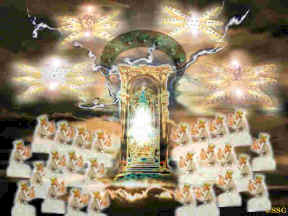
24 Elders Having Harps of God
|
What are harps? The Word of God. The
"elders" are not the Word of God, but the elders have the Word of God. In
THE
NEW CREATION, Vol. 6, p. 233 we read:
"And, thank God! we find that harmony existing, so that the
Scriptures of the Old and New Testaments constitute what the Lord himself designates
‘the harp of God.’ Revelation 15:2 And the various testimonies of the Law and
the prophets are the several chords of that harp, which, when tuned by the holy Spirit
dwelling in our hearts, and swept by the fingers of the devoted servants and searchers
after divine truth, yields the most enchanting strains that ever fell on mortal
ears."
The "harps" are the Word. The elders have
"harps." They are not "harps." The elders are not the
Word of God.
 See
"Casting Down Golden Crowns" for Detailed Explanations
See
"Casting Down Golden Crowns" for Detailed Explanations

Seven Torches of Fire

|
"And out of the throne
proceeded lightnings and thunderings and voices:
And there were seven lamps of fire burning before the throne, which are
the seven Spirits of God."
Revelation 4:5
|
The "seven Spirits" of God are before the
throne. This is the verse John refers to in Revelation 1:4 when he conveys the greetings
of the "seven Spirits which are before his throne."
There is a stark contrast here. You have the throne scene up to this
point being very staid and tranquil like a sea of glass. Then, in Revelation 4:5 the
tranquility is interrupted by "lightnings and thunderings and voices" coming
from the "throne."
Lightning is bright and illuminating. As the flashes of light proceed
from the throne, they raise voices and controversial thunder. This is the reaction to
God’s flashes of light.
The "seven lamps of fire," or torches,
burning before the throne, embody "seven Spirits" or teachings of God. Hence, the
"sevens lamps of fire" in essence are seven teachings or messages or spirits
from God. That’s part of our answer. The "seven lamps" or
"lampstands" are the "seven churches" we are told in Revelation 1:20.
The scene turns tranquil again concentrating on the throne.

|
"And before the throne there was a
sea of glass like unto crystal [undisturbed by the lightning and thunder]: and
in the midst of the throne, and round about the throne, were four beasts full of eyes
before and behind."
Revelation
4:6
|
The "sea of glass"
portrays God’s purity and righteousness. It was illustrated in
Solomon’s temple with the giant laver. Jesus taught, "Blessed are the pure in
heart: for they shall see God."
This vision emphasizes the eternal aspect of purity and righteousness
in the divine purpose. There can never be sin pollution here. God has a large universe,
but not one square inch to spare for sin or sinners.
The idea that God is going to provide for sinners in a hell of torment
is absolutely ridiculous. That would mean God would have to provide a part of his universe
to house them and keep them. No! All the wicked will God destroy when his work is
complete. God has zero tolerance for sin. Those who sympathize with sin persistently can
have no place in God’s everlasting kingdom.
The four "Living Creatures," representing the four
attributes of God, are on each side of the throne. They are "full of
eyes" which look forward and backward. The eternity of the
future and of the past is clearly seen. He who "inhabits
eternity" also sees into eternity.
There have not been and will not be any conditions which our God could
not or cannot harness to redound to His glory. The far-seeing wisdom of God guarantees his
sovereignty. There never have been any emergencies with God, nor will there ever be.
